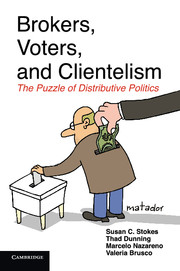Mobilizing Poor Voters
Democracy has provided opportunities for political representation and accountability, but it has also created incentives for creating and maintaining clientelistic networks. Why has clientelism consolidated with the introduction of democracy? Drawing on network analysis, Mobilizing Poor Voters answers this question by describing and explaining the emergence, maintenance, and disappearance of political, partisan, and social networks in Argentina. Combining qualitative and quantitative data gathered during twenty-four months of field research in eight municipalities in Argentina, Mobilizing Poor Voters shows that when party leaders distribute political promotions to party candidates based only on the number of voters they mobilize, party leaders incentivize the use of clientelistic strategies among candidates competing to mobilize voters in poor neighborhoods. The logic of perverse incentives examined in this book explains why candidates who use clientelism succeed in getting elected and re-elected over time, contributing to the consolidation of political machines at the local level.
- Provides an account of the success and failure of clientelistic networks in Latin America
- Combining network analysis with qualitative and quantitative data, the book uses a creative multi-layered research design to study clientelistic networks
- Contributes to the promotion and advancement of effective public policies
Reviews & endorsements
"This innovative book shows the value of careful multi-method research for our understanding of the micro-foundations of clientelism and its pervasive power in new democracies. Relying on impressive fieldwork as well as surveys, Mobilizing Poor Voters illuminates the different preferences of political brokers, which had been previously ignored by the literature, while also explaining the incentives that make brokers relying on clientelistic distribution more electorally successful. This second effect is crucial for understanding the predominance of clientelistic electoral strategies to mobilize poor voters. This well-crafted and insightful book will surely become a must-read for the study of clientelism and electoral mobilization in new democracies."
Maria Victoria Murillo, Columbia University
"Despite flourishing research on network analyses, most of the literature takes individuals (nodes) for granted and relationships (vertices) as unproblematic. In most network analyses, a node is a node is a node. This is definitely not the case in this wonderful book by Mariela Szwarcberg, which uses extensive ethnographic research to describe the making of clientelistic individuals and relationships. This is an original and rich theory of clientelistic mobilization through network building."
Ernesto Calvo, Associate Chair of Government and Politics, University of Maryland
Product details
July 2015Hardback
9781107114081
192 pages
236 × 156 × 15 mm
0.39kg
7 b/w illus. 3 maps 13 tables
Available
Table of Contents
- 1. Politics on the ground: mobilizing poor voters in Argentina
- 2. The microfoundations of political clientelism
- 3. Building a party network: political, partisan and social networks in Argentina
- 4. Moral hazard and asymmetric information in clientelistic networks
- 5. The logic of perverse incentives
- 6. Scaling up: the logic of perverse incentives at the subnational level
- 7. Politics on the ground: a comparative perspective
- 8. Conclusions: winners lose.









